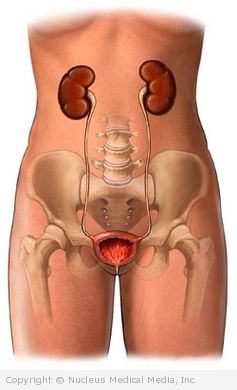Radical cystectomy
(Bladder Removal)
Radical cystectomy – Definition
A radical cystectomy is a surgery to remove the bladder.
Radical cystectomy – Reasons for Procedure
Reasons for a cystectomy include:
- Cancer of the bladder
- Problems with nerve-muscle control of the bladder
- Bladder damage from radiation or chemotherapy
- Bladder damage or bleeding from other conditions, treatments, or injuries
Radical cystectomy – Possible Complications
Complications occur in 25%-35% of patients undergoing cystectomy. If you are planning to have a cystectomy, your doctor will review a list of possible complications, which may include:
- Infection
- Bleeding
- Loss of sexual function
- Fluid build-up in the abdominal cavity
- Damage to other organs
- Blockage of urine flow from the ureters to the bladder
- Nutritional problems (depending on the bowel segments used to create a way for urine to drain)
- Blood clots
- Reaction to anesthesia
- Urinary incontinence
Previous surgery in the abdomen or pelvis or radiation to the area increase your risk of complications.
Radical cystectomy – What to Expect
Prior to Procedure
Doctors recommend that you quit smoking before surgery. You may also need to take antibiotics to prevent infection and laxatives to clean out the bowels.
The night before, you may be asked not to eat anything and only drink clear liquids. After midnight and on the morning of the procedure, do not eat or drink anything. This includes avoiding clear liquids, coffee, tea, and water.
Talk to your doctor about your medicines. You may be asked to stop taking some medicines up to one week before the procedure, like:
- Aspirin or other anti-inflammatory drugs
- Blood thinners, such as clopidogrel (Plavix) or warfarin (Coumadin)
Radical cystectomy – Anesthesia
General anesthesia is given before surgery. You will be asleep.
Radical cystectomy – Description of Procedure
An incision will be made in the abdomen to expose the bladder. All blood vessels to the bladder will be cut. The bladder will then be removed. Other tissues and organs may also need to be removed with the bladder.
The doctor will also need to create a new way for urine to be passed out of the body. A new bladder may be built using pieces of intestine, or an external bag may be attached to the abdomen.
Radical cystectomy – How Long Will It Take?
About 1-5 hours
Radical cystectomy – How Much Will It Hurt?
Anesthesia will prevent pain during the surgery. Recovery is usually painful. Your doctor will give you medicine to help manage the pain.
Radical cystectomy – Average Hospital Stay
The usual length of stay is 5-12 days. The specific length will depend on your condition and the reason for surgery. Your doctor may also choose to keep you longer if complications arise.
Radical cystectomy – Post-procedure Care
At the Hospital
- A stay in the intensive care unit for 2-3 days may be needed.
- During surgery, a tube will be placed from the nose to the stomach. It will remain in for several days. Since you cannot eat with the tube in place, you will receive IV fluids.
- If a urine bag was attached during the surgery, you will be taught how to dispose of urine.
At Home
When you return home, do the following to help ensure a smooth recovery:
- Strenuous activity should be avoided for 4-6 weeks.
- Avoid heavy lifting, straining, and sexual activity for a period of time.
- Driving and climbing stairs is usually allowed. Ask your doctor about any restrictions.
- Ask your doctor about when it is safe to shower, bathe, or soak in water.
- Be sure to follow your doctor’s instructions.
Radical cystectomy – Call Your Doctor
After you leave the hospital, contact your doctor if any of the following occurs:
- Signs of infection, including fever and chills
- Redness, swelling, increasing pain, excessive bleeding, or discharge from the incision and/or stoma site
- Nausea and/or vomiting
- Pain that you cannot control with the medicines you have been given
- Inability to urinate or difficulty urinating, extreme cloudiness or pus in the urine, a bad odor to the urine
- Cough, shortness of breath, or chest pain
In case of an emergency, call for medical help right away.

